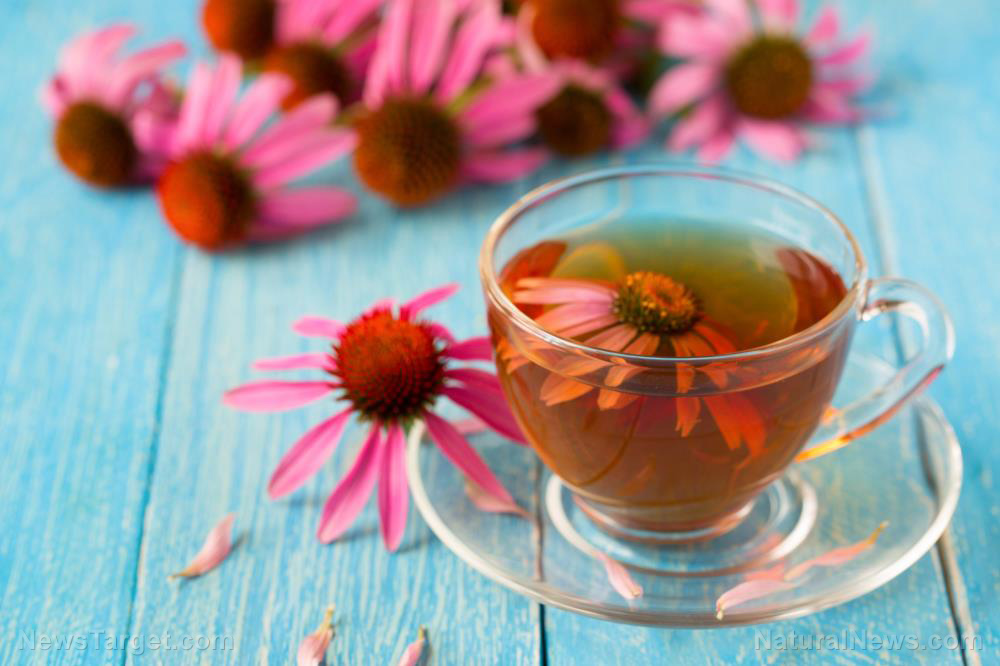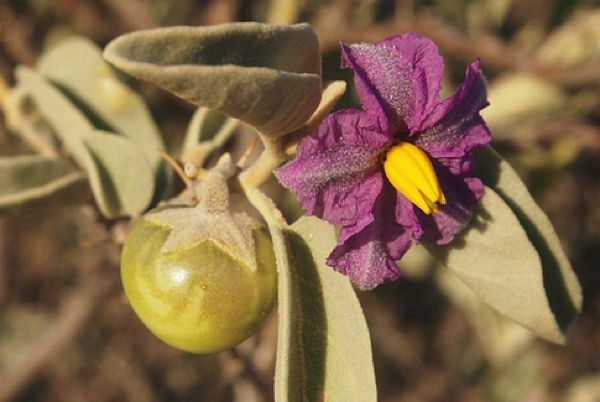Echinacea: The immune-boosting powerhouse with a rich history
02/21/2025 / By Ava Grace

- Echinacea, particularly species like Echinacea purpurea and E. angustifolia, has a long history of medicinal use by Native American tribes, such as the Lakota Sioux, for treating infections, wounds and colds. Its use spread to European settlers and became widely popular in the 19th century.
- Echinacea contains various bioactive compounds including alkylamides, phenolic compounds, polysaccharides and flavonoids, which contribute to its immune-modulating, anti-inflammatory and antimicrobial properties.
- Echinacea is known for boosting the immune system, reducing the duration and severity of colds, combating infections, reducing inflammation, promoting wound healing and supporting mental health by reducing anxiety.
- Echinacea is available in various forms such as teas, tinctures, capsules and topical creams. It is commonly used for immune support, skin conditions and as a dietary supplement.
- Despite its traditional use and anecdotal evidence, the efficacy of echinacea is still a topic of scientific debate. However, its enduring popularity in traditional medicine highlights its perceived value. Incorporating echinacea into wellness routines can offer a range of health benefits.
Echinacea, a genus of flowering plants in the daisy family (Asteraceae), has long been revered for its medicinal properties. Two of its most well-known species, Echinacea purpurea and E. angustifolia, have been used for centuries to combat infections, boost immunity and promote overall wellness. With its vibrant petals and potent phytonutrients, echinacea is a cornerstone of herbal medicine.
Brief history of echinacea
Echinacea’s medicinal use can be traced back to Native American tribes, who first discovered its therapeutic properties. The Plains Indians, particularly the Lakota Sioux, used E. angustifolia to treat snakebites, wounds and infections. They also brewed echinacea tea to alleviate colds, sore throats and toothaches.
European settlers later adopted these practices, and by the late 19th century, echinacea had become a popular remedy in the United States and Europe. (Related: Echinacea extract can help address mild anxiety in adults, reveals study).
The name echinacea comes from the Greek word echinos, meaning “hedgehog,” a nod to its spiky, cone-shaped center. Today, echinacea is primarily grown in North America, particularly in the central and eastern United States, where it thrives in well-drained soils and sunny climates. It is also cultivated in parts of Europe for commercial use.
Phytonutrients in echinacea
Echinacea is rich in bioactive compounds that contribute to its therapeutic effects. These include:
- Alkylamides – Known for their immune-modulating and anti-inflammatory properties
- Phenolic compounds – Includes caffeic acid derivatives like echinacoside and chicoric acid, which have antioxidant and antimicrobial effects
- Polysaccharides – Complex carbohydrates that support immune function and promote healing
- Flavonoids – Antioxidants that protect cells from oxidative stress and enhance echinacea’s medicinal benefits
Health benefits of echinacea
Echinacea is most commonly associated with immune support, but its benefits extend far beyond cold prevention. Research suggests that echinacea can:
- Reduce the duration and severity of colds – Studies have shown that echinacea can shorten the duration of colds by up to 1.5 days and reduce symptom severity.
- Combat infections – Its antimicrobial properties make it effective against bacterial and viral infections, including urinary tract infections and respiratory illnesses.
- Reduce inflammation – Echinacea’s anti-inflammatory compounds can help alleviate conditions like arthritis and skin irritations.
- Promote wound healing – Topical application of echinacea can accelerate the healing of cuts, burns and eczema.
- Support mental health – Evidence suggests that echinacea may help reduce anxiety and improve mood by modulating the immune system.
How to use echinacea
Echinacea is available in various forms, including teas, tinctures, capsules and topical creams. For immune support, many people brew echinacea tea or take it in liquid extract form. The herb’s slightly bitter, earthy taste is often balanced with honey or lemon in teas. Topical applications are popular for treating skin conditions, while capsules offer a convenient option for daily supplementation.
Incorporating echinacea into your diet can be both enjoyable and beneficial. Here are a few recipe ideas:
- Immune-boosting echinacea tea – Combine dried echinacea root or leaves with ginger, lemon and honey for a soothing beverage.
- Echinacea-infused honey – Steep echinacea flowers in honey for a sweet, medicinal spread.
- Echinacea smoothie – Blend echinacea tincture with berries, spinach and almond milk for a nutrient-packed drink.
- Echinacea salad dressing – Mix echinacea extract with olive oil, apple cider vinegar and herbs for a healthful dressing.
Echinacea is more than just a pretty flower — it is a potent herbal remedy with a rich history and a wide range of health benefits. Whether used to fend off colds, reduce inflammation or promote wound healing, this versatile plant has earned its place in the pantheon of superfoods. By incorporating echinacea into your wellness routine, you can harness the power of nature to support your health.
This story is not medical advice and is not intended to treat or cure any disease. Always consult with a qualified naturopathic physician for personalized advice about your specific health situation or concern.
Visit NaturalNews.com, a great article source where you can learn about superfoods and their health benefits.
You can also try Brighteon.ai, an AI model created by Mike Adams, also known as the Health Ranger. This model is available as a free download to be run locally and is designed to help share and decentralize knowledge. By doing so, it aims to bypass censorship and empower people with knowledge.
If you’re looking for an uncensored video free speech website where you can openly discuss nutrition, natural medicine, ingredients and more, check out Brighteon.com and our two free speech social media sites, Brighteon.IO and Brighteon.social.
Watch this video for more on the benefits of Echinecea.
This video is from the Holistic Herbalist channel on Brighteon.com.
More related stories:
Echinacea offers herbal relief for multiple sclerosis symptoms.
Echinacea: One of the best supplements for overly stressed people.
Quickly get rid of your colds with Echinacea.
Echinacea purpurea proven effective against radiation.
Sources include:
Submit a correction >>
Tagged Under:
alternative medicine, antiviral, Echinacea, health science, herbal medicine, Herbs, immune system, infections, natural antibiotics, natural cures, natural healing, natural health, natural medicine, Naturopathy, organics, phytonutrients, plant medicine, remedies, supplements
This article may contain statements that reflect the opinion of the author





















